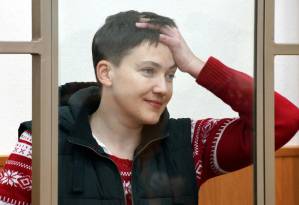Savchenko defence reject any appeal against expected ’guilty’ verdict
 Photo: Anton Naumlyuk
Photo: Anton Naumlyuk
While the lack of any justice in Russia’s trial of Ukrainian ex-military pilot and MP Nadiya Savchenko is internationally recognized, the defence’s announcement that it will not appeal against a guilty verdict is of concern. The outcome of any trial of the 34-year-old Savchenko may be a foregone conclusion, but the European Court of Human Rights demands that all legal remedies must have been exhausted. It may, of course, be that the defence is convinced that other measures, such as an exchange, will free Nadiya Savchenko, yet even so the position seems suspect.
Ilya Novikov, one of Savchenko’s lawyers spoke to journalists after the court hearing on Wednesday. He explained that they had no doubt that Savchenko would be convicted as charged, and said that Nadiya Savchenko does not want to create the impression that there is a court of law by appealing against the anticipated ruling.
Novikov is reported as saying that for Savchenko, the main reason for rejecting any appeal is moral. “There is no court in Russia, not at first instance, nor second, nor ten. That means you mustn’t give grounds for thinking that there is a court. She believes this.”
As further evidence that the court in Russian Donetsk is simply waiting to hand down the already determined sentence, Novikov cites the fact that the court has not once tried to even obtain the documents sent by Ukraine’s Prosecutor General’s Office, which have been lying at the post office for several weeks. Novikov is convinced that presiding judge Leonid Stepanenko will do everything to ensure that the documents are not added to the case.
Open Russia quotes the lawyer as saying that the issue is one of sanctions against Russia being toughened, as well as other forms of international pressure. Asked if negotiations were underway with politicians from other countries, he said “no comment”.
It is certainly true that all countries have demanded the release of Nadiya Savchenko, who is not only a Ukrainian MP, but a delegate to the Parliamentary Assembly of the Council of Europe, and was taken by force to Russia after being captured by Kremlin-backed militants in Ukraine. Her release is required by the Minsk Accords to which Russia is a party.
Whether this means that a manifestly unjust sentence and refusal to release her would elicit an international response that went beyond statements of indignation is unfortunately disputable. Savchenko is not the only Ukrainian Russia is holding prisoner, and the case against Ukrainian filmmaker Oleg Sentsov, sentenced to 20 years imprisonment, and civic activist Oleksandr Kolchenko (10 years) also bears no resemblance to a court of law, to name just one of many farcical trials.
Savchenko has said that she will resume her hunger strike if convicted. Her sister Vera says that for the first 10 days Nadiya would take only water, and after that refuse anything at all.
Nadiya Savchenko became dangerously thin after a less extreme hunger strike held for 82 days. She resumed taking food in March, explaining that she was choosing different tactics in fight against injustice. There was enormous concern for her life then. Mustafa Dzhemiliev, veteran Crimean Tatar leader who spent 15 years in Soviet labour camps and a record time on hunger strike, had even called on her to give up, saying it was senseless to expect human behaviour from Moscow and that they would find some way to rescue her.
The verdict is expected around Dec 24. At present the defence are questioning Vera Savchenko whose testimony, they report, has already overturned much of the prosecution’s case.
The trial so far, however, has given no grounds for confidence that the court will pay heed to irrefutable evidence of Savchenko’s alibi and of the trumped-up nature of the entire trial.
Nadiya Savchenko was taken prisoner in the morning of June 17, 2014, several hours before Russian journalist Igor Kornelyuk and cameraman Anton Voloshin came under mortar fire while reporting from an area in the Luhansk oblast where there was heavy fighting.
She was captured by Kremlin-backed militants who even posted a video of her being interrogated. It first became clear that she was in Russia when a court in the Voronezh oblast (nowhere near where the trial is now taking place) remanded her in custody.
For a long time the Russian investigators were silent about Savchenko’s abduction. Then they claimed that she had escaped and inexplicably crossed the border into Russia. The final version is that the militants themselves ‘released her’, after which she allegedly hurtled towards the Russian border, covering a huge distance in an hour and a half.
The investigators’ version is that she crossed the border illegally ‘pretending’ to be a refugee, and that she was stopped initially in a routine check of papers. The Investigative Committee responded with particular cynicism to the demand from the Parliamentary Assembly of the Council of Europe (which Savchenko is now a delegate of) by adding another charge of having ‘crossed the border illegally’.
She is charged with murder and attempted murder. The prosecution has failed to find the binoculars with which Savchenko is supposed to have seen the journalists 3 and a half kilometres away and the equipment with which she is alleged to have informed Ukrainian soldiers of their whereabouts. And she has an alibi. However the court’s refusal to allow evidence that exposed a fraudulent ‘witness’ aimed at overturning the alibi was only one of many occasions over the last months when the judges have appeared to be collaborating with the prosecution.
See, for example, Savchenko’s Kremlin-backed militant captor allowed to give testimony in secret
Please write to Nadiya Savchenko, if possible, in Russian. The address is:
ПКУ СИЗО-3 346408 Ростовская обл.
г. Новочеркасск, ул Украинская д.1, Савченко Надежде Викторовне





